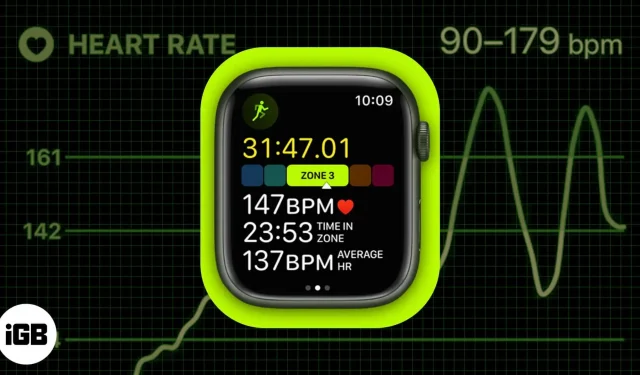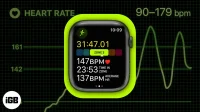Apple has made significant strides in fitness with watchOS 9 and iOS 16. Heart rate zone tracking is one of the most exciting features recently added to the Apple Watch arsenal. Confused about heart rate zones? Don’t worry. In this article, I’ll explain what heart rate zones are and how you can use watchOS 9’s heart rate zone tracking.
- What are heart rate zones?
- How to View Heart Rate Zones on Apple Watch and iPhone
- How to Change Heart Rate Zones on Apple Watch and iPhone
What are heart rate zones?
Apple explains heart rate zones as a percentage of your maximum heart rate; it is automatically calculated and personalized using your health data. In addition, each Apple Watch has five heart rate zones that show you the intensity of your workout by measuring your heart rate at different stages of your workout.
The heart rate zone should not be confused with the heart rate, as the latter is the number of times the heart beats per minute.
Note. Heart rate zones will be calculated based on the information you provide in the Health app on iPhone.
Why Use Heart Rate Zones?
The heart rate zone is a plus as it would be difficult to constantly monitor the heart rate sensor and calculate your heart rate during a cardio workout. By integrating heart rate zones into watchOS 9, Apple has completely simplified the calculation and calculation process and allowed you to focus solely on exercise.
It’s important to keep in mind that you may not find numbers as similar to those shown here, and the reason for this is that my health data and your health data will not match. For a person born in 1998 who weighs 80 kg and is 170 cm tall, Apple classifies five heart rate zones as follows:
- Zone 1: Heart rate below 141 bpm or 60% of maximum heart rate.
- Zone 2: Heart rate is in the range of 142-153 beats per minute or 60-70% of the maximum heart rate.
- Zone 3: Heart rate is in the range of 154-165 beats per minute or 70-80% of the maximum heart rate.
- Zone 4: Heart rate is in the range of 167-178 beats per minute or 80-90% of the maximum heart rate.
- Zone 5: Heart rate above 179 bpm or 90% of maximum heart rate.
Maximum heart rate: 220 – age
Note. Here HR refers to the heart rate.
How to View Heart Rate Zones on Apple Watch and iPhone
Now that the concept of heart rate zones is clear, you must be looking forward to learning how to view them on your Apple Watch and iPhone. But before that, you should know how to add heart rate zones to Apple Watch.
Include Heart Rate Zones in Workout Views on Apple Watch
- Launch the Workout app.
- Go to the three points next to the cardio exercise. For example, you can choose “Indoor Walk”.
- Tap the pencil icon in the Open section.
- Select Workout Views.
- Then click Edit Views.
- Scroll down to “Heart Rate Zones”→ turn on “Enable”.
Congratulations! You have now successfully incorporated heart rate zones into your workout. Now follow these steps to view your heart rate zone on your Apple Watch and iPhone.
View your heart rate zone during a workout on Apple Watch
- Launch the Workout app on your iPhone.
- Choose cardio. For example, tap Walk Indoors.
- Scroll down to the Heart Rate Zones section. You can rotate the Digital Crown up/down to scroll.
In addition, in the training mode, the heart rate zones are divided into five. You are shown the zone you are in according to your voltage. You can also check your heart rate, time in zone and average heart rate directly on the display.
Viewing your heart rate zone data on iPhone
- Open the Fitness app.
- Go to your workout summary.
- Click Show More next to Heart Rate.
In the Heart Rate section, you will see a graph showing the time spent in each zone.
How to Change Heart Rate Zones on Apple Watch and iPhone
Heart rate zones are automatically calculated based on the age, height, and weight entered in the Health app on your iPhone. So, if you are an athlete familiar with heart rate zones, you can set them up by following the methods below:
On Apple Watch
- Go to the Settings app on your Apple Watch.
- Scroll down and tap Workout → Heart Rate Zones.
- Click Manual.
- Select the zone you want to edit.
- Adjust the limits according to your preference. You can rotate the digital crown or click on the symbols (+, -).
- Click Done.
Note. You can change the high limit for zone 1, the low limit for zone 5, and the high and low limits for zones 2, 3, and 4.
On iPhone
- Open the Watch app on your iPhone.
- Tap My Watch → Workout.
- Scroll down and tap Heart Rate Zone.
- Click Manual. You can then edit the zones in the Heart Rate Zones section.
- Tap the number next to Beats per minute and make the necessary changes. After entering the data, touch the screen anywhere to confirm.
That’s it, folks!
Along with sleep tracking and low power mode, heart rate zones are another cool feature in watchOS 9. I use it on my watch to track my heart rate while I work out. Do you use it too? Let me know in the comments.


